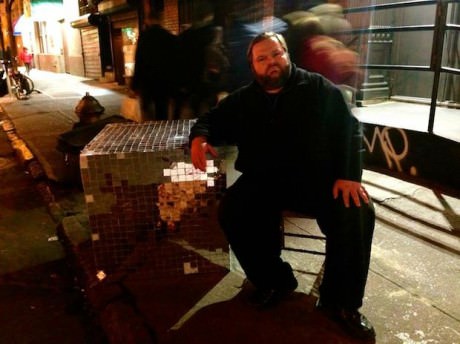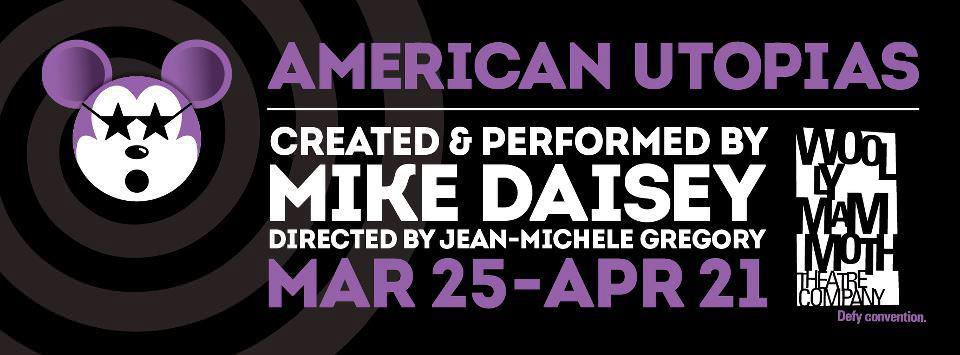A Letter to Mike Daisey
Dear Mike,
Now that we’ve escaped from the conventions that would keep you on the stage and keep me at the distance of objective criticism; now that I’ve shaken your hand the way you shook that kid’s hand in Zuccotti Park on the anniversary of the occupation; now that I’ve walked away from you the way you walked away from him, without saying what you meant to say; now that I’ve gotten out of my chair and gone into the street to look for that kid, or for the quality you saw in him that made you shake his hand and made me shake yours; now that I’ve recalled what brought me to the theater in the first place, to any theater, recalled what made me want to write about what happens in a theater – now that you’ve reminded me – I have to tell you something:
I thought it was over.
The second time everyone laughed when you said the word ‘fuck,’ I thought it was over, because I thought you wanted us to laugh at words like ‘fuck.’ I thought: this isn’t going to work for me. Nothing’s going to happen here, I thought.
If it had been over, this review would say, “In American Utopias a big guy sits at a table for two and a half hours and tells stories. Half-stories, broken stories, three separate story strands that connect only under the title American Utopias, which seems too easy. He never stands up. He never stops talking.” “You marvel at his stamina,” I would have written, “though after while it starts to feel a little like a filibuster.”

If it had been over, I would have pointed out that you wore black clothes on a black stage so that we saw just your face, your neck, your ham-like forearms, and your hands. “No interesting theatrical use of the space,” I would have pointed out. “No interesting theatrical use of light. No interesting theatrical sounds, except the blackboard-scratching that your voice achieves when you push a lot of air out all at once. Mike Daisey has a dramatic body,” I would have written.
“Daisey’s work defies theatrical conventions,” I would have written if it had been over. “It violates the unities of action, place, and time. It jumps from Burning Man to Disney World, to Occupy Wall Street without any signal that it’s jumping or any effort to explain what one strand of narrative has to do with another,” which would have struck me as a criticism of our need to make the pieces of a story fit together. “Who said the pieces have to fit together,” I would have written if it had been over.
Defies is not the right word, I know now because it wasn’t over: your work does not defy, it just gets up and walks away.
I thought it was over at the end of the first round, after each of the narrative strands had reached a credible conclusion. The Burning Man strand had concluded with the kids who stepped into your camp and asked if anybody knew where the orgy dome was. ‘Fresh-faced,’ you called them, bound for Harvard in the fall. You were particularly pleased that the girl felt safe enough to approach your fire and ask that question, and pleased again that everybody knew the answer. That seemed like a good stopping place: fresh faces seeking pleasure at the misfit festival before learning how to lead America toward a future that will take the freshness out of every face.
The Disney strand had concluded with the advertisements on the bus convincing you to lock in prices for your next trip to the magic kingdom, where the mise en scene is more compelling than reality because its purpose is to make you think it’s real, where fifty rows of banners in the parking lot hammer home the Maoist mantra that “Your memories begin now” (which is all we need to know about corporatism), where all the little girls who had tiaras stapled to their heads the moment they were born – I mean the very moment, you said, while they’re still sticky — turn into feral princesses as soon as the go through the gate.
The Zuccotti Park strand had concluded with the brave young man who volunteered to leave the camp to speak to supporters of the occupation who were sending pizzas from a hotel in Brooklyn but could not occupy the park themselves because they were afraid of dorkiness, and they had heard that some of what the people did there was a little dorky, like wiggling their fingers to express approval, and the, well, utopian component of their vision was a little dorky too, especially when Bloomberg News reported that millionaires outnumbered occupiers in Manhattan by the rate of 230 to one.
If it had been over, I would have written that, “Yes, narratives can alter consciousness as thoroughly as psychotropic drugs, and that, yes, we live inside of narratives that shape us to their purposes, the second most insidious of which is probably the narrative of freedom, second only to the story of the ‘City on the Hill,’ the Utopian vision that persists today in bacchanalian incoherence, or in corporate absolute coherence, or in feckless rainbow-chasing. Or feckless monologues. Or feckless commentary on the plight of modern theater.”
If it had been over, I would have walked around the corner to the gelato shop, ordered coffee, tidied up my notes, and wrung my hands. “Tisk tisk, my my, oh dear,” I would have written: the indecency of power in America! Because that’s what would have mattered, if it had been over. And by tomorrow none of it would matter any more that Bikram Yoga or a bottle of Ribera wine.
If it had been over I would not have heard you say we’re safe in here. In any other circumstances, like Zuccotti Park, a group like this is subject to governmental regulation, but in the theater we’re an audience, not a crowd that has to be controlled, or a mob that has to be dispersed. In the theater, we have special exception for assembly, because nothing dangerous is going to happen. Everybody knows that.
Disarmed and anything but dangerous. Until you said you wanted more.
Shouldn’t there be a chance that someone might get wet, or cold, or angry? Or speak out? Or lose his capacity to speak, or his ironic distance from the aching world?
At first I thought that you were looking down in laughter on American utopias, but in the end I saw that wasn’t true: you’re laughing in the middle of them, while you live them and you try to figure them out. You’re an independent unregulated artist in the American theater, as you said, and if that’s not a utopian statement, I don’t know what it is.
Whatever theater’s supposed to do, Mike, or not supposed to, the urge to talk to you like this is closer to connection than anything I’ve felt in any of the gelato shops I’ve sat in tidying my notes after shows that didn’t make me want to talk to anyone.
You may be right that I will not remember what you said, but I’ll remember what you did: you made me want to shake your hand and say to you exactly what you wanted to say to that young man in Zuccotti Park when you and he returned to mark the anniversary, a year after he was arrested by the mob dispersal team that had no right to cuff his hands and carry him away. They pulled the ziptie so tight and they left it on so long that he felt nothing in his hands for weeks, he said.
“I’m afraid to be here,” he admitted to you. “They might arrest me again.” That’s when you shook his hand and tried to say the same thing that I tried to say to you. Which is, “You are so fucking brave. Do you know that you’re so brave?”
The mysteries of why we like to be disarmed and why we don’t say what we want to say persist. But now you’ve said it to him. And I’ve said it to you.
You won me over Mike! You’re amazing!
Running Time: Two hours and 15 minutes, with no intermission.
American Utopias, starring Mike Daisey and directed by Jean-Michele Gregory, plays through April 21, 2013, at Woolly Mammoth Theatre Company – 641 D Street, NW, in Washington, DC. For tickets, call (202) 393-3939, or purchase them online.





